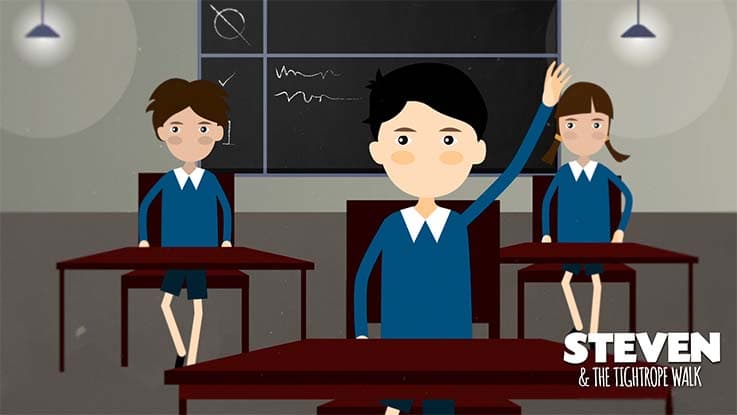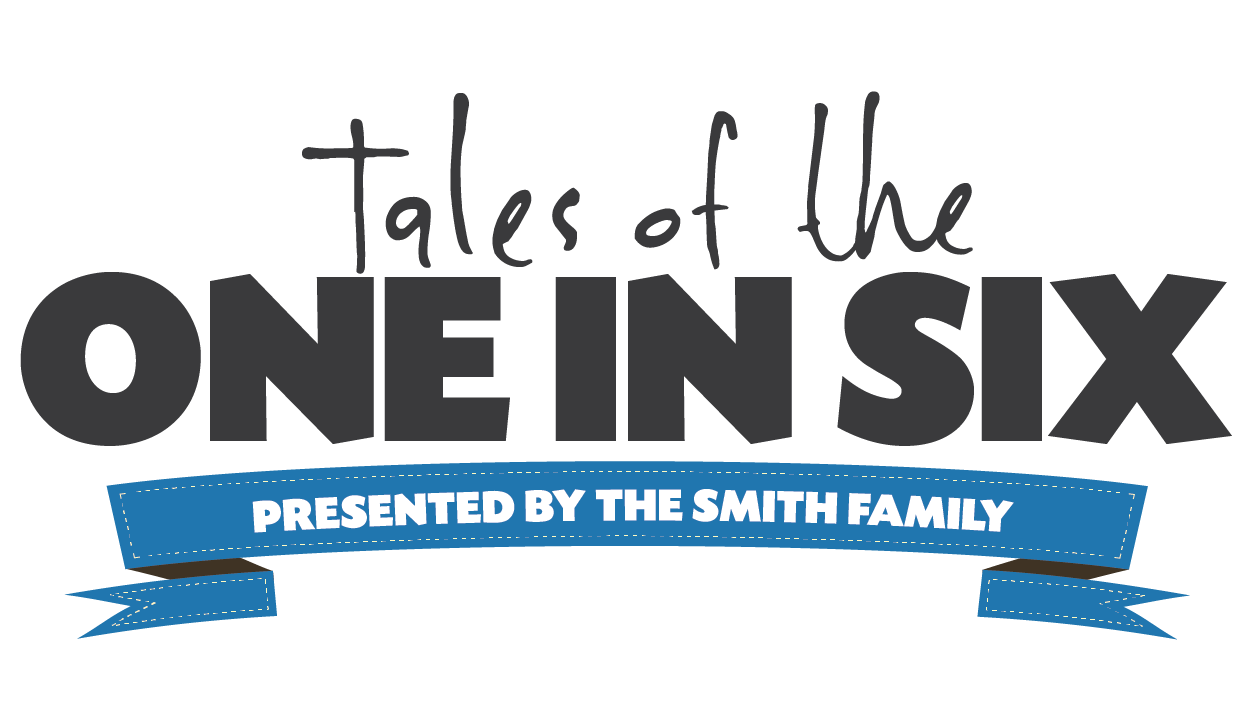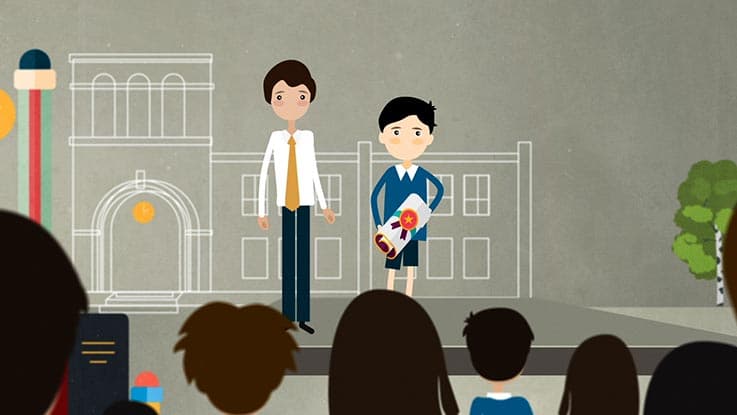
Steven and The Tightrope Walk
When his family lost their home due to financial hardship, Steven’s world was turned upside down. With nowhere else to go, the family moved in to share his aunt’s small apartment.
It broke Steven’s heart to see his mum feeling so helpless, trying to stay strong and brave for her children.
All Steven wanted was to make his mum proud, but they couldn’t afford the basics that he needed for school. And there was so little room at home that Steven had to study on the kitchen floor.
He started to fall behind at school and felt embarrassed and alone, unable to see how he would get through it.
Your support can help children like Steven regain their confidence and create a different future for themselves.
Right now, Australian children are living in poverty

The impact on their learning is clear
Not all children get an equal start in life. Steven is just one of the one in six1 Australian children living in disadvantage today.
Some families have experienced many generations of disadvantage. For others, a more recent change in health, employment or family relationships has affected them so badly that they are no longer able to meet the daily costs of living.
With limited financial resources, the day to day life of a family changes significantly. If the parents are working, they are more likely to be working irregular hours or travelling long distances for work.
This puts pressure on other family members, including children, to keep the household running. Teenagers may have to work to supplement the family income, leaving them little or no time to study – and no one there to help them if they’re struggling with school work.
With so much focus on just ‘getting by’, many of these kids don’t have something as simple as a school bag, a complete uniform or the schoolbooks they need to make the most of their education. School excursions and activities are an impossible luxury. They are often teased or left out by other students because they don’t ‘fit in’.
The impact of disadvantage on learning
From the moment they are born, there’s an increased risk of disadvantaged children like Steven falling through the cracks. They often miss out on early learning experiences and opportunities that other children receive.
When they start school, they’re already behind. One in three children from Australia’s most disadvantaged communities do not meet one or more key developmental milestones when they start school.2

After my dad died, mum had to stop working to look after us. Even being able to afford a school uniform was hard. Other kids made fun of me - I felt so alone.
Without the learning skills and support they need, they struggle to keep up. As the gap between them and their classmates widens their confidence erodes and their self-esteem crumbles, leaving them feeling overwhelmed and without hope for the future.
Disadvantaged students are on average 2-3 years behind in reading and maths by the time they are 15 years old.3 If we don't intervene in the early years, they can fall so far behind at school they give up trying – shut themselves off from their class mates, stop participating in class, or even give up on going to school altogether. This can set up a pattern of underachievement that can last the rest of their lives.
Research shows Year 12 completion rates are significantly lower (68%) for students from disadvantaged backgrounds than for students from more advantaged backgrounds (79%).4 Young people from advantaged backgrounds are three times more likely to attend university than students from vulnerable backgrounds.5
How you can help
Your support can change the lives of children like Steven, by providing them with the extra out-of-school support they need to catch up and keep up at school.
Your gift today will give a child access a range of out-of-school learning, mentoring programs and financial support that begin in the early years and continue through to high school and tertiary education.
By sponsoring a child like Steven, you can will be giving them life-changing, comprehensive support so they can finally fit in and get the most out of their schooling.
You can empower young Australians to lift themselves out of poverty and onto a better path – breaking the cycle of disadvantage, one child at a time.
About Tales of the One in Six

Tales of the ‘One In Six’ is an animated web series based on the real stories of Australian children from disadvantaged backgrounds, who struggle daily with the effects of financial hardship.
The stories are drawn from the challenging but inspiring stories of children who have overcome adversity, thanks to the generosity of people like you.
Using a simple animated style, together with elements of traditional fairy tales, these short films will draw you into the inner world of these children to reveal their stories of hardship and transformation.
Thousands of disadvantaged children are at risk
Steven is just one of the one in six1 Australian children living in poverty today.
From the moment they are born, there’s an increased risk of these children falling through the cracks. Growing up in a jobless family where basic necessities are hard to come by, means disadvantaged children miss out on early learning experiences and opportunities that other children receive. Then, when they start school they’re already behind.
Without the learning skills and support they need, they struggle to keep up. In fact, by the time they are 15, they’ll be almost 3 years behind other children in their reading ability. As the gap between them and their classmates widens their confidence erodes, their self-esteem crumbles, leaving them feeling overwhelmed, lonely and isolated.
Find out how The Smith Family is supporting disadvantaged Australian children with out-of-school education support.

Late at night, I sometimes had to study on the kitchen floor because there just wasn’t room elsewhere. I started to fall behind at school because we couldn’t afford the books or school trips - I felt so alone.
Bare essentials we often take for granted like books or stationary were hard to come by, slowly Steven started to be left behind, he felt alone and powerless.
A sponsorship from The Smith Family’s Learning for Life program helped give Steven the resources and the confidence to continue with his studies, finish Year 12 and attend university, an achievement he once didn’t think possible. He now works full-time in managerial position in the health sector.
Steven believes that The Smith Family’s support was the reason he was able to make it through school.
Tales of the One in Six

Alice and The Giant Emptiness

David and The Big Heavy

Jess and The Mighty Journey
2 Australian Government (2016) Australian Early Development Census National Report, 2015: A snapshot of early childhood development in Australian, DET: Canberra.
3 Thomson et al, 2011, Challenges for Australian Education: Results from PISA 2009.
4 Australian Curriculum, Assessment and Reporting Authority 2012. National Report on Schooling in Australia 2010: Additional statistics
5 Department of Education, Employment and Workplace Relations, 2008, Review of Australian Higher Education Final Report.

